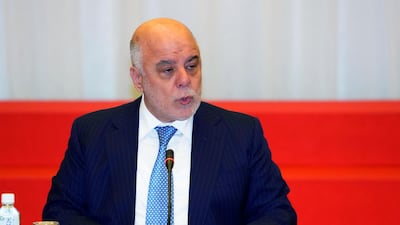Iraqi Prime Minister Haider Al Abadi promised to ensure a fair general election next month after raising doubts about the country's electoral body.
“The Independent High Electoral Commission contains many problems,” Mr Al Abadi told reporters in Baghdad on Sunday.
He said “there is nothing independent" about the electoral commission and that the Iraqi parliament, which selects the panel, would be responsible for ensuring that the electoral process was unbiased.
“It is our responsibility to guarantee fair and just elections to the public and to support the IHEC,” Mr Al Abadi said
He said his government would follow up and suggest “improvements” to the commission.
Mr Al Abadi is seeking another term after taking office in September 2014, nearly four months after the Iraqi army collapsed in the face of an ISIS assault, leaving the extremist group in control of nearly a third of Iraq.
_______________
Read more:
Iraq vice president says elections alone will not solve the country’s problems
Iraq kicks off election campaign amidst public anger
_______________
Iraq's fractured political landscape since the 2003 US-led invasion overthrew dictator Saddam Hussein has led to allegations of electoral fraud in previous elections.
Nearly 7,000 candidates are competing for 329 seats in the May 12 general election, which will be Iraq’s fourth since 2003.
"Given Iraq's history of election-season instability, the upcoming elections could deepen existing tensions rather than unify the country," the International Crisis Group said in a report.
Iraq's next government will face the challenge of rebuilding the war-torn country after a three-year war against ISIS and battling entrenched corruption that is eating away at its oil revenue.
The country also faces one of the world's largest humanitarian crises, with more than three million people internally displaced as a result of the battle against ISIS.
Politicians “must find a way for displaced persons to participated without fear of intimidation,” the International Crisis Group said.
The country is also trying hundreds of men and women accused of links to ISIS. On Monday, the Justice Ministry announced the execution 13 people, including 11 convicted of "terrorism". They include individuals responsible for car bombings, killing security forces and kidnappings, it said.

Iraqi elections since 2003 have typically been accompanied by violence, with two attacks on politicians reported on Sunday.
A car bombing in Kirkuk, a contested multi-ethnic city some 250 kilometres north of Baghdad, killed one person and wounded 11.
"A civilian was killed and 11 people were injured, including three bodyguards, in the convoy of Ammar Hadaya Kahya, a candidate for the Turkmen Front in Kirkuk," the head of the Iraqi Turkmen Association in Europe, Sundus Abbas, told The National.
“Since 2003 we have been used to being targets, we don’t know who has been targeting our party members,” Mrs Abbas said.
“This has been an occurring case against the Turkmen in Kirkuk for the last 15 years. We believe this is done to get us to abandon our homes,” she said.
Iraqi troops seized the oil-rich Kirkuk region from Kurdish forces last year after a controversial vote for independence in Iraq's autonomous Kurdish region.
Turkmen largely welcomed the return of government control, after the Kurds took over the area amid the chaos of ISIS’s march across Iraq in 2014.
“We welcomed the return of Iraqi troops to Kirkuk, as they are a neutral entity,” Mrs Abbas said. “The targeting of Turkmen has decreased since last October. However, we are anticipating further attacks.”
Since the return of Baghdad's forces, the region has seen clashes between Kurdish fighters and Turkmen units of the Hashed Al Shaabi paramilitary forces, which are officially part of the government forces.
Mr Kahya, the election candidate whose convoy was attacked, is an adviser to Falah Al Fayadh, who heads the Hashed.
Also on Sunday, an MP of the National Coalition party, Abdul Karim Abtan, survived an assassination attempt.
Mr Abtan’s convoy was shot at with silenced weapons in Dora district of southern Baghdad, security officials said.
_______________
Read more:
Iraq's international oil auction to be delayed by contractual changes
Iraq struggles to expel Kurdish militia from the north
_______________


